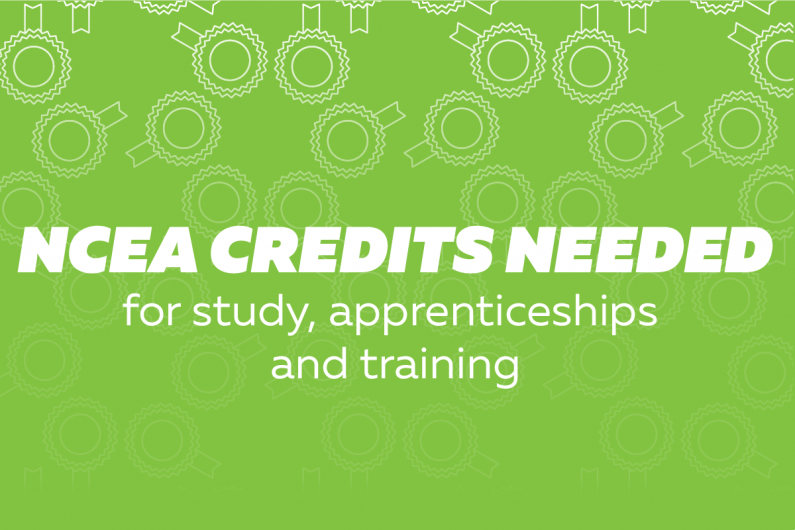NCEA credits needed for study, apprenticeships and training

Find out what NCEA credits you need to enter tertiary study or on-the-job training, including apprenticeships and defence, police and firefighter roles.
What's on this page?
- NCEA credits for university
- NCEA credits for wānanga, private training establishments and Te Pūkenga
- NCEA credits for apprenticeships
- NCEA credits for defence jobs
- NCEA credits for police and firefighter jobs
- Options if you don’t meet entry requirements or have other qualifcations than UE
- Find out more
NCEA credits for university
To enter a New Zealand university you usually need at least University Entrance (UE), made up of:
- NCEA Level 3
- three approved NCEA subjects at Level 3 with 14 credits in each
- 10 literacy credits at Level 2 or above – 5 credits in reading and 5 in writing
- 10 approved numeracy credits at Level 1 or above.
Your record of achievement will show whether you qualify for University Entrance.
Rank scores
Some universities offer you guaranteed entry if you reach their guaranteed entry rank score (unless there are also other entry requirements).
Your rank score summarises your best NCEA results into points and:
- is based on your University Entrance-approved subjects
- is calculated on your best NCEA Level 3 credits
- allocates higher points for excellence and merit grades.
Qualifications may have different minimum rank scores for enrolment. For example:
- a Bachelor of Arts might have a minimum rank score of 150 points
- a Bachelor of Commerce might have a minimum rank score of 210 points.
- University of Auckland website - information on rank scores
- Victoria University of Wellington website - information on guaranteed entry scores
Other requirements for entering university
Depending on the course you want to enrol in, and who provides it, you may also need to:
- pass particular NCEA subjects or achievement standards
- attend an interview or audition
- provide a portfolio
- have relevant voluntary or paid work experience
- pass police checks
- provide references.
NCEA credits for wānanga, private training establishments and Te Pūkenga
Entry requirements for wānanga, private training establishments, and Te Pūkenga vary:
- Level 1 to 4 certificates may not have particular NCEA requirements. However, literacy and numeracy are usually useful, and some courses require specific NCEA subjects.
- Level 5 and 6 certificate and diploma entry requirements vary from NCEA Level 2 to University Entrance.
- Degrees usually require University Entrance or an approved Level 4, 5 or 6 qualification.
- NZQA website - understanding New Zealand qualifications
NCEA credits for apprenticeships
NCEA maths and English to Level 2 are useful for getting an apprenticeship. For some apprenticeships you need specific NCEA subjects. For example, apprentice electricians usually need NCEA Level 2 physics.
Check our job profiles to identify the relevant industry training organisation to find out about NCEA requirements for apprenticeships you are interested in.
NCEA credits for defence jobs
To enter the Army, Navy or Air Force, you need to:
- have at least three years of secondary schooling
- pass medical and physical tests
- pass aptitude tests on maths, reasoning and intelligence, for example. (NCEA Level 1 maths, English and science will help you to pass these tests.)
You may also need to meet other NCEA requirements, depending on the defence job you’ve applied for. For example, in the Army:
- trainee communications system operators need 10 credits in literacy and 10 in numeracy at NCEA Level 1
- trainee carpenters need NCEA Level 1 with at least 12 science credits.
- Defence industry information
- Defence Careers website - entry to Defence Force roles
NCEA credits for police and firefighter jobs
If you want to become a police officer or a firefighter, NCEA literacy and numeracy credits at Level 1 are useful, but not essential.
Options if you don’t meet entry requirements or have other qualifcations than UE
If you don’t meet all entry requirements for a course, contact the education provider as you may get special entry through lower-level courses to get you ready for study, or under a special admission category.
Find out entry requirements if you have studied another qualification rather than UE, or if you don't have UE.
Updated 5 Dec 2024